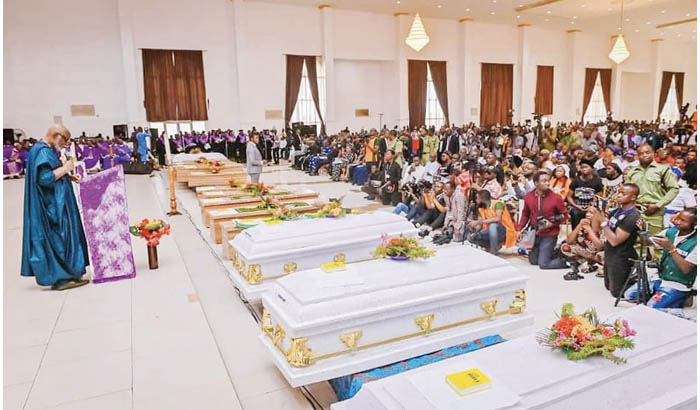By Peter Omopo
Abuja | September 10, 2025 — The Federal High Court in Abuja on Wednesday rejected a bail application filed by five men accused of being members of the Al-Shabaab terrorist group and of carrying out the June 5, 2022 attack on St. Francis Catholic Church in Owo, Ondo State, which left more than 40 worshippers dead and over 100 injured.
The suspects — Idris Abdulmalik Omeiza, Al Qasim Idris, Jamiu Abdulmalik, Abdulhaleem Idris, and Momoh Otuho Abubakar — are standing trial on nine terrorism-related charges under the Terrorism (Prevention and Prohibition) Act, 2022. They were arraigned on August 11, 2025, and pleaded not guilty before being remanded in the custody of the Department of State Services (DSS).
Their counsel, Abdullahi Awwal Ibrahim, argued that the men had secured “reliable and responsible sureties” and urged the court to grant them bail. The application, dated August 11 and argued on August 19, also stressed that the defendants would not abscond.
However, the DSS, represented by Dr. Callistus Eze, opposed the motion, insisting that releasing the defendants would pose a significant security risk, potentially intimidate witnesses, and jeopardise the trial, given the gravity of the charges and strength of the evidence.
In his ruling, Justice Emeka Nwite sided with the prosecution, describing the charges as capital offences and warning that granting bail would amount to a “judicial risk.” He faulted the bail application for procedural defects, noting that the defendants’ names were not listed on the motion paper as required by law, and that the supporting affidavit was improperly filed as a joint two-paragraph statement instead of separate affidavits for each accused person.
The court ordered that the five men remain in DSS custody and granted an accelerated hearing, fixing October 19, 2025, for the commencement of trial.
The Owo church massacre remains one of the deadliest terrorist attacks in Nigeria in recent years, sparking outrage locally and internationally and raising alarm about the expansion of extremist networks beyond the North-East strongholds of Boko Haram and ISWAP.

